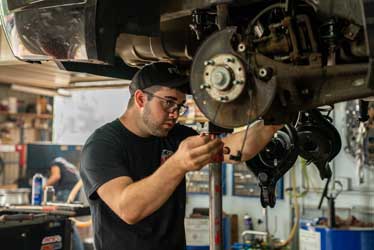All Categories
Featured

[/image]
Regular engine tune-ups are important for keeping your lorry's efficiency, boosting gas effectiveness, and prolonging its lifespan. Whether you're a skilled auto owner or a newbie, understanding the crucial facets of an engine tune-up can aid you keep your auto running efficiently for several years. Below are some important pointers to assist you with the procedure.
- Change the Glow Plugs. Spark plugs are little however mighty parts that play an important role in firing up the fuel-air mixture in your engine. With time, they can use out or become fouled, bring about poor engine efficiency, lowered gas efficiency, and difficult beginnings.
During a tune-up, examine your ignition system for wear and replace them as necessary. For a lot of cars, stimulate plugs need to be changed every 30,000 to 100,000 miles, relying on the type and material. Fresh trigger plugs ensure effective combustion and smoother engine operation.
- Check and Change the Air Filter. The air filter is your engine's initial line of protection versus dust, particles, and other pollutants. A clogged or dirty air filter can restrict air movement, causing your engine to function more difficult and consume more gas.
Check your air filter during a tune-up and change it if it's dirty or past its recommended solution period. A clean air filter enhances engine performance and enhances fuel economic situation.
- Check the Fuel System. In time, your fuel system can collect dirt and carbon down payments, minimizing engine efficiency and gas effectiveness. Cleaning the gas injectors and gas lines during a tune-up aids maintain appropriate fuel delivery and combustion.
You can use a fuel system cleaner or have a specialist mechanic carry out a more extensive cleansing. This step is specifically advantageous for older vehicles or autos frequently driven in stop-and-go traffic.
- Inspect the Belts and Hose pipes. Belts and hoses are essential for various engine functions, such as running the generator, water pump, and air conditioning. During a tune-up, look for splits, fraying, or indicators of endure these elements.
Replace any kind of worn-out belts and hose pipes to stop potential break downs. A broken belt or dripping tube can cause engine getting too hot or loss of power, so resolving these issues promptly is vital.
- Replace the Engine Oil and Oil Filter. Engine oil is essential for lubricating relocating parts, reducing rubbing, and regulating engine temperature level. In time, oil comes to be contaminated and loses its efficiency.
As part of a tune-up, change the engine oil and oil filter. Use the type of oil recommended by your automobile's producer and stay with the suggested change periods. Tidy oil maintains your engine running efficiently and stops premature wear.
- Evaluate the Battery and Charging System. A healthy and balanced battery is crucial for beginning your vehicle and powering its electric systems. During a tune-up, inspect the battery's voltage and examine the terminals for deterioration. Clean the terminals if needed and make certain a safe and secure connection.
Additionally, examination the alternator and billing system to guarantee your battery stays charged during procedure. If your battery is weak or old, think about replacing it to avoid unforeseen malfunctions.
- Flush and Replenish the Coolant. The air conditioning system regulates your engine's temperature level, stopping it from overheating. Old or contaminated coolant can shed its efficiency, causing possible engine damage.
Throughout a tune-up, flush the old coolant and replace it with a fresh blend. Also, inspect the radiator, thermostat, and tubes for leaks or damages. Keeping the cooling system in excellent problem guarantees your engine operates at the appropriate temperature.

- Address Warning Lights and Unusual Symptoms. Modern lorries are equipped with analysis systems that signal you to prospective concerns through dashboard warning lights. If your check engine light or any kind of other advising signs are on, resolve them throughout your tune-up.
In addition, focus on uncommon symptoms such as strange sounds, rough idling, or reduced fuel performance. A professional auto mechanic can diagnose and solve these problems throughout the tune-up process.
- Do Not Neglect the Exhaust System. Your auto's exhaust system eliminates hazardous gases from the engine and makes certain proper discharges. Check the exhaust system for leakages, rust, or damage during a tune-up. A faulty exhaust system can impact engine performance and result in environmental and safety and security problems.
- Use High-Quality Parts and Fluids. When changing components or topping off liquids during a tune-up, constantly select top notch items that fulfill your lorry's specs. Utilizing substandard parts or wrong fluids can adversely influence your engine's efficiency and durability.
Final Thought: Normal Tune-Ups Are Secret to Engine Wellness. Making the effort to tune up your engine guarantees it runs effectively, conserves gas, and decreases the danger of malfunctions. Whether you do these jobs yourself or depend on a trusted auto mechanic, routine tune-ups are a financial investment in your lorry's reliability and durability. Follow these pointers, and you'll enjoy a smoother, extra dependable trip for years to find.
Latest Posts
Discover WyHy Federal Credit Union – Exclusive Benefits for Your Financial Success
Why Routine Vehicle Maintenance at Montclare Auto Repair Keeps Your Wallet Happy
Seamless Aluminum Rain Gutters: The Smart Selection for Your Home
More
Latest Posts
Discover WyHy Federal Credit Union – Exclusive Benefits for Your Financial Success
Why Routine Vehicle Maintenance at Montclare Auto Repair Keeps Your Wallet Happy
Seamless Aluminum Rain Gutters: The Smart Selection for Your Home